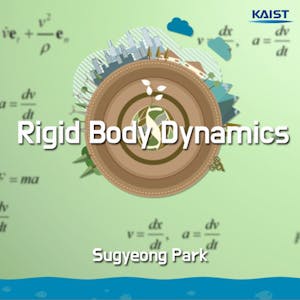Rigid Body Dynamics is a fundamental course in mechanical engineering that delves into the principles of force, motion, and energy. Through a series of lecture videos, practice problems, and standalone homework, students will gain a deep understanding of dynamics, including the integration of Newton's 2nd law over time and displacement.
The course encompasses various topics, such as rotation, relative velocity, relative acceleration, Newton-Euler equation, work and energy, impulse and momentum, 3D rotation, kinematics of general 3D motion, angular momentum, equations of motion in 3D, gyroscopic motion, and steady precession.
By the end of the course, students will have acquired the knowledge and skills necessary to analyze and solve complex problems related to rigid body dynamics, laying a strong foundation for their future endeavors in mechanical engineering.
Certificate Available ✔
Get Started / More Info
Rigid Body Dynamics comprises 15 modules covering topics such as rotation, velocity, acceleration, Newton-Euler equation, work and energy, impulse and momentum, 3D motion, gyroscopic motion, and more, providing a comprehensive understanding of mechanical dynamics principles.
The first module includes lecture notes, providing an overview of the course structure and expectations.
Module 2 delves into introductory concepts such as rotation, absolute and relative velocity.
Module 3 continues with angular velocity of rigid bodies and includes practice quizzes for reinforcement.
Module 4 focuses on relative acceleration and motion relative to a rotating axis.
Module 5 covers the Newton-Euler equation, translation, rotation, and includes a practice quiz.
Module 6 explores the translation and rotation motion of disk and rod type rigid bodies.
Module 7 delves into work and energy of disk type rigid bodies and includes a practice quiz.
Module 8 continues with work and energy, including the work by internal force and kinetic energy.
Module 9 focuses on impulse and momentum of disk type rigid bodies, along with a practice quiz.
Module 10 covers impulse and momentum of rod type rigid bodies, asymmetric rigid bodies, and angular momentum formulation.
Module 11 explores 3D rotation and includes practice quizzes for reinforcement.
Module 12 delves into the kinematics of general 3D motion.
Module 13 focuses on angular momentum in 3D and includes a practice quiz for reinforcement.
Module 14 covers equations of motion in 3D and work and energy of rigid bodies in 3D.
Module 15 explores gyroscopic motion, steady precession, and concludes with a comprehensive final test.
This course provides a rigorous treatment of spatial motion and the dynamics of rigid bodies, employing representations from modern screw theory and the product...
This course focuses on understanding tension in building structures, exploring its role in sustaining forces, and studying the design of cable-stayed bridges and...
Mastering Statics is a comprehensive course covering the principles of statics, equilibrium, and internal forces in structures. Students will gain essential knowledge...
This specialization delves into semiconductor characterization, covering electrical, electron beam, ion beam, x-ray, and optical measurement techniques for semiconductor...